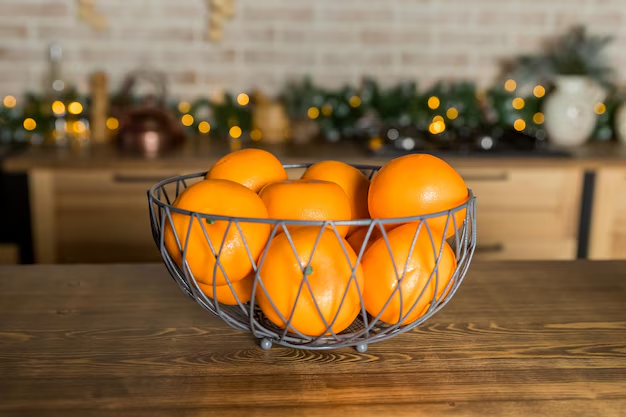Should You Store Oranges in the Refrigerator? A Complete Guide to Keeping Your Citrus Fresh
In a world where keeping food fresh is a daily concern, a common question arises in kitchens everywhere: Do you store oranges in the refrigerator? As simple as it seems, this query touches on several areas of food storage, nutrition, and practical kitchen strategies. Understanding the nuances can help you make informed decisions that benefit both your taste buds and your wallet. Let’s explore the ins and outs of storing oranges, their ideal conditions, and what happens when you refrigerate them.
🍊 The Nature of Oranges
What Makes Oranges Unique?
Oranges are beloved for their juicy, sweet taste and vibrant color. As part of the citrus family, they are packed with vitamin C, fibers, and antioxidants, contributing to a healthy diet. Their thick outer peel provides a natural and robust protection against environmental factors, which plays a significant role in how they should be stored.
How Do Oranges Ripen?
Unlike some fruits, oranges are non-climacteric, meaning they don’t continue to ripen once picked. This fact influences how long they remain fresh and flavorful. An orange's peak condition essentially locks in once it leaves the tree, making storage methods crucial to maintain quality and taste.
🌡️ Refrigerator vs. Countertop: The Great Debate
Keeping Oranges on the Countertop
The countertop has been the traditional home for many fruits, including oranges. Placing them in a fruit bowl can certainly add a splash of color to your kitchen decor. Here are some benefits and considerations:
- Aesthetics: They brighten up any kitchen space.
- Convenience: Easily accessible for quick snacks or meal preparations.
- Timeframe: Generally, oranges can last up to a week at room temperature without a significant loss in quality.
However, warmer climates might accelerate spoilage, especially in summer months.
Refrigerating Oranges: Pros and Cons
Refrigerating oranges can extend their freshness by several weeks, which can be particularly useful for bulk purchases or minimizing food waste. Here are some aspects to consider:
- Longevity: Refrigeration markedly slows down the decay process.
- Taste: The cool environment may alter texture slightly and potentially numb the flavor.
- Space Management: Refrigerating large quantities could monopolize precious fridge space.
When refrigeration is in play, the ideal temperature for storing oranges is around 45°F (7°C), although they’ll fare well in normal fridge conditions too.
🍽️ How to Store Oranges the Right Way
Storing on the Counter
- Location: Choose a cool, shaded place away from direct sunlight and heat sources.
- Arrangement: Avoid stacking to prevent bruising, which can shorten their shelf life.
Storing in the Refrigerator
- Placement: Use the crisper drawer, which is designed to maintain optimal humidity for fruits.
- Container: A breathable mesh bag or an open container is preferable to allow air circulation.
🔄 When to Combine Both Methods
Short-Term vs. Long-Term Needs
Not all storage situations are the same. Depending on how soon you plan to consume your oranges, mixing these methods might work best:
- Immediate Consumption: Leave a few on the countertop for easy access.
- Extended Freshness: Store surplus in the refrigerator to keep them fresher longer.
🎨 Other Refrigerator Topics: The Science Behind Storage
Ethylene and Its Effects
Ethylene gas is a natural ripening agent produced by some fruits. Oranges are not highly sensitive to ethylene, but storing them with ethylene producers like bananas can affect freshness due to prolonged exposure to this gas.
The Impact of Temperature Fluctuations
Inconsistent temperatures, especially in refrigerators, can wreak havoc on fresh produce. Be mindful of this when organizing your fridge. A solid strategy is to keep the cooling settings stable and avoid frequent door openings.
📝 Quick Storage Tips for Oranges
Here is a handy list to ensure your oranges stay juicy and fresh:
- 🥶 For Longevity: Store in the fridge crisper at ~45°F (7°C).
- 🌞 For Immediate Use: Keep a few at room temperature, away from heat.
- 🍊 Avoid Ethylene Exposure: Separate from high-ethylene fruits.
- 🌀 Ensure Air Circulation: Use mesh bags or open containers.
- 🧊 Consistent Temperatures: Maintain steady fridge conditions.
🍋 Expanding on Citrus: Storing Other Fruits
Oranges are not alone in the citrus family. Lemons, limes, and grapefruits might require different storage tactics based on their peel thickness and purpose. While lemons thrive similarly to oranges under refrigeration, limes might benefit slightly from room temperature storage if used quickly.
🥳 Wrapping it Up with Fresh Ideas
In conclusion, whether or not to refrigerate oranges depends on your consumption habits, kitchen space, and climate. By marrying both countertop and refrigerator methods, you can enjoy the flexibility of enjoying fresh oranges whenever a craving strikes. Additionally, understanding how these principles apply to other fruits helps create a smarter and more efficient approach to food storage. With these insights in hand, you’re well on your way to making informed decisions that preserve both taste and freshness, empowering your kitchen endeavors to new heights!

